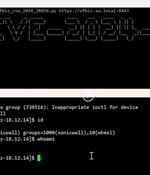Security News

A new zero-day pre-authentication remote code execution vulnerability has been disclosed in the Apache OFBiz open-source enterprise resource planning system that could allow threat actors to achieve remote code execution on affected instances. "The root cause of the vulnerability lies in a flaw in the authentication mechanism," SonicWall, which discovered and reported the shortcoming, said in a statement.


Why a strong patch management strategy is essential for reducing business riskIn this Help Net Security interview, Eran Livne, Senior Director of Product Management, Endpoint Remediation at Qualys and Thomas Scheffler, Security Operations Manager of Cintas Corporation, discuss their experiences with automated patch management. These risks are driven by heightened cybersecurity threats, evolving regulations, and increased public awareness of security breaches.

Ransomware operators have been leveraging CVE-2024-37085, an authentication bypass vulnerability affecting Active Directory domain-joined VMware ESXi hypervisors, to gain full administrative access to them and encrypt their file system."ESXi is a bare-metal hypervisor that is installed directly onto a physical server and provides direct access and control of underlying resources. ESXi hypervisors host virtual machines that may include critical servers in a network," Microsoft's threat analysts explained.

A Telegram for Android zero-day vulnerability dubbed 'EvilVideo' allowed attackers to send malicious Android APK payloads disguised as video files. A threat actor named 'Ancryno' first began selling the Telegram zero-day exploit on June 6, 2024, in a post on the Russian-speaking XSS hacking forum, stating the flaw existed in Telegram v10.14.4 and older.

The zero-day exploit used to leverage CVE-2024-38112, a recently patched Windows MSHTML vulnerability, was wielded by an APT group dubbed Void Banshee to deliver malware to targets in North America, Europe, and Southeast Asia, threat hunters with Trend Micro's Zero Day Initiative have shared. As previously explained by Check Point researcher Haifei Li, the attackers used files that were specially crafted to exploit the vulnerability but were made to look like PDFs. "The threat actor leveraged CVE-2024-38112 to execute malicious code by abusing the MHTML protocol handler and x-usc directives through internet shortcut files. Using this technique, the threat actor was able to access and run files directly through the disabled Internet Explorer instance on Windows machines," Trend Micro researchers noted.

The Japanese Space Exploration Agency discovered it was under attack using zero-day exploits while working with Microsoft to probe a 2023 cyberattack on its systems. Then there's the mention of zero-day attacks in the last sentence of a section about countermeasures like closer network monitoring and improve remote access security the agency adopted.

Haifei Li discovered that threat actors have been distributing Windows Internet Shortcut Files to spoof legitimate-looking files, such as PDFs, but that download and launch HTA files to install password-stealing malware. An Internet Shortcut File is simply a text file that contains various configuration settings, such as what icon to show, what link to open when double-clicked, and other information.

CVE-2024-38112, a spoofing vulnerability in Windows MSHTML Platform for which Microsoft has released a fix on Tuesday, has likely been exploited by attackers in the wild for over a year, Check Point researcher Haifei Li has revealed. "Check Point Research recently discovered that threat actors have been using novel tricks to lure Windows users for remote code execution. Specifically, the attackers used special Windows Internet Shortcut files, which, when clicked, would call the retired Internet Explorer to visit the attacker-controlled URL," he explained.

For July 2024 Patch Tuesday, Microsoft has released security updates and patches that fix 142 CVEs, including two exploited zero-days in Windows Hyper-V and Windows MSHTML Platform. CVE-2024-38080 is a integer overflow or wraparound bug affecting Hyper-V, Windows' native hypervisor for creating virtual machines on systems running Windows and Windows Server.